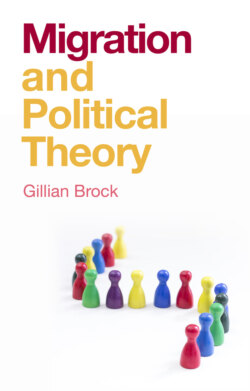Читать книгу Migration and Political Theory - Gillian Brock - Страница 24
2.2.4 The utilitarian case for open borders
ОглавлениеThere are several ways in which utilitarians might launch their case. One concern is that closing borders leads to economic inefficiencies that reduce the prospects for promoting utility or wellbeing. Barriers to participation in markets prevent people from being happily and usefully employed in countries where their skills are needed. Open borders make it more likely that markets can function well, as labor moves to where it is most needed. Open borders result in increased productivity and promote economic wellbeing.
A utilitarian might also worry about closed borders resulting in unequal distributions of wealth. If borders were open, many from poor countries would migrate to places that could improve their life prospects. Similarly, if borders were open, those who currently live under tyrannical regimes would be able to move away from such situations. In both cases, the countries experiencing large-scale migrations might be incentivized to improve domestic prospects. And those recipient countries experiencing large inflows might also be motivated to assist in stemming political oppression and improving life prospects in countries of origin. So on this line of argument, opening borders can therefore be expected to improve economic efficiency, reduce global inequality, and improve the prospects for those living under oppressive regimes.
Some believe this case is unconvincing, however, since it fails to take account of important costs (e.g. Christopher Wellman in Wellman and Cole 2011). If one factors in the costs of denying states control over immigration, it is not clear that there are the net gains imagined. For instance, a system of closed states may enable us to avoid a situation we could describe as a global tragedy of the commons. One important role that governments play is in taking responsibility for the territory, such as the environment and, according to Rawls (1999), the population size. Only if countries are forced to internalize the costs of their decisions will they take responsibility for matters in their territory that will have a bearing on how congenial life becomes in the future. Without governments being forced to take responsibility for the future wellbeing of their citizens, many of the necessary conditions that make for prosperity will be eroded.
In cases such as these, a utilitarian might argue that a better long-term strategy would be to support a system of self-determining states while also expanding efforts to export the economic and political arrangements that make wealthy liberal democracies desirable to so many migrants.
